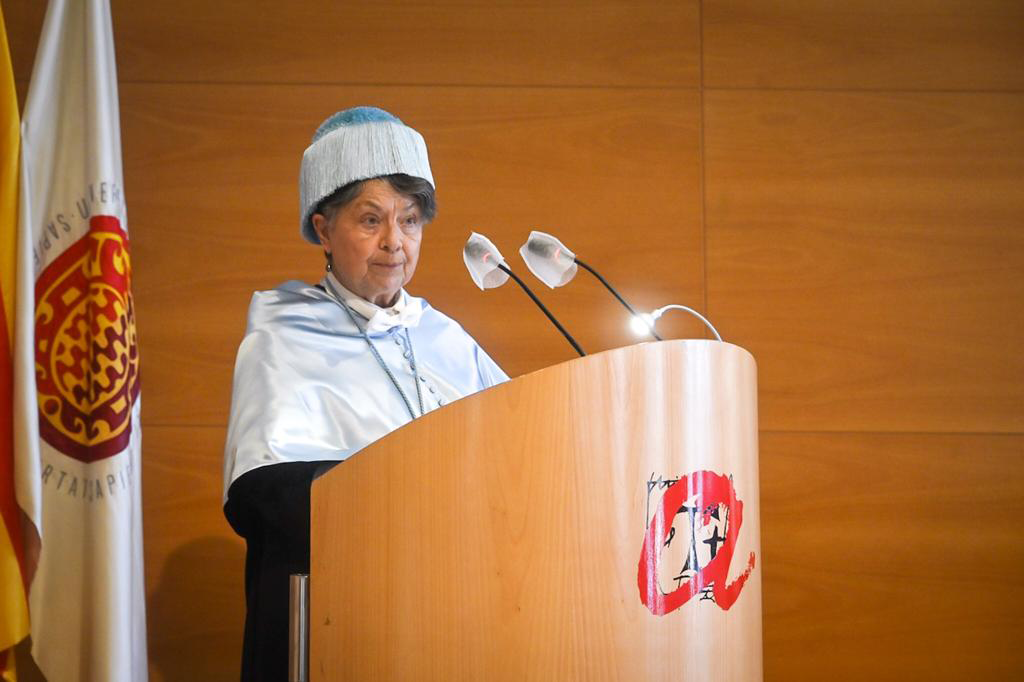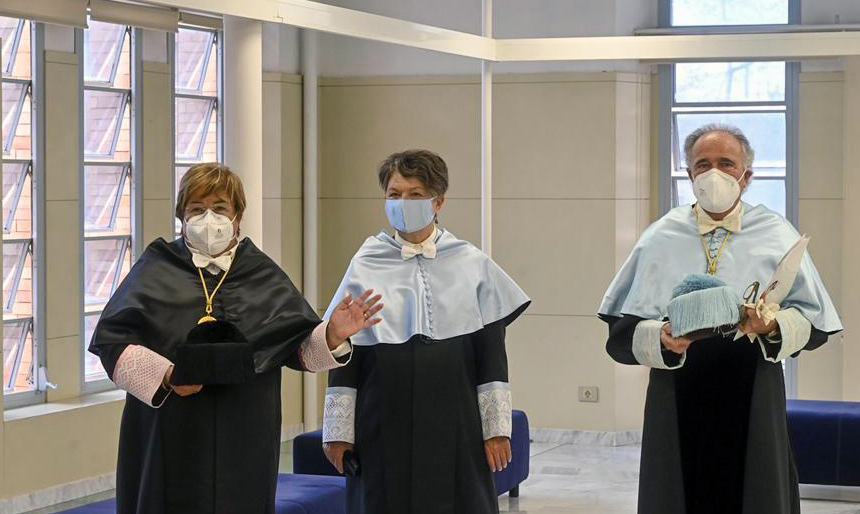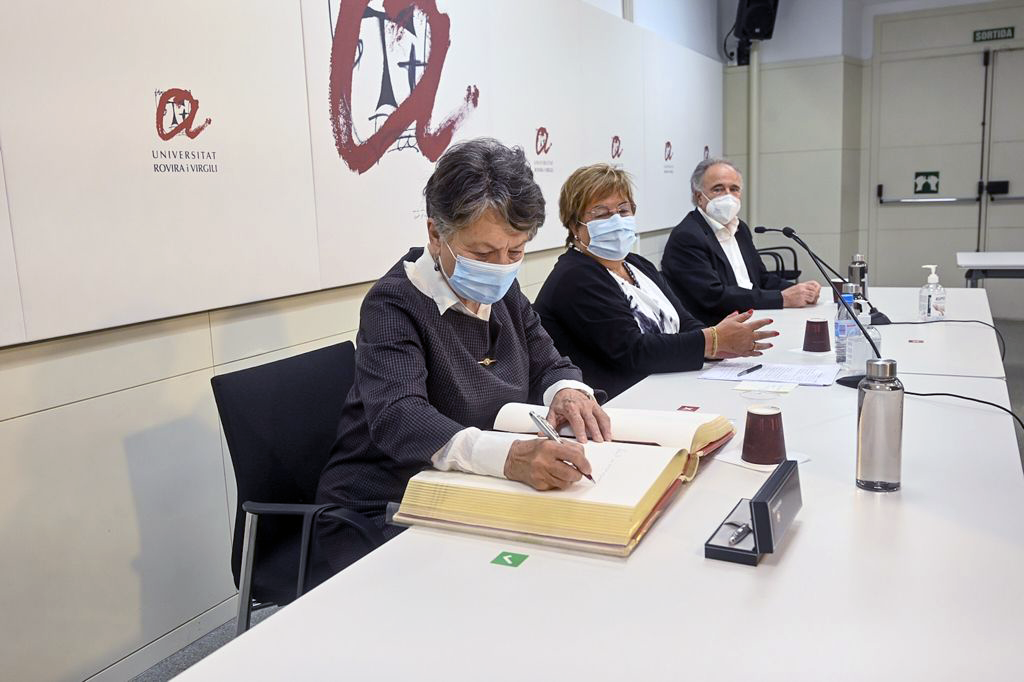30/04/2021
Marina Subirats, promoter of equality policies, awarded an honorary doctorate by the URV
The eminent sociologist, a pioneer in feminist research on education in Spain, argues for the dissolution and disappearance of gender in order to reach a new stage of equality and freedom among all people

The eminent sociologist, a pioneer in feminist research on education in Spain, argues for the dissolution and disappearance of gender in order to reach a new stage of equality and freedom among all people
Marina Subirats, who has been invested this afternoon as an honorary doctor by the Universitat Rovira i Virgili, is a leading figure in the promotion of equality policies, both for her research on the sociology of education and women and for her public and political service. She has served as director of the Women’s Institute of the Ministry of Social Affairs, as a member of the Equal Opportunities Committee of the European Union, as councillor for Education for Barcelona City Council and member of the State School Council, among other positions.
Dr Subirats’ research has provided the theoretical and practical foundations on which rest our current equality policies. The eminent sociologist began her research on the education and inequality of women in 1976, just as the feminist movement was starting to gain momentum in Spain. “Then we knew nothing; we were a generation without teachers, ” she said in her inaugural speech, for whom the implementation of mixed schools posed new challenges regarding understanding how gender is unconsciously transmitted in the classroom. Through the study of language and the use of school spaces and materials, she found, as a sociologist, how mixed schools continued to discriminate against girls and imposed a rigid and demanding model of behaviour on boys.
Despite progress regarding gender issues in recent years, Dr Subirats believes that the solution for achieving a true stage of equality between women and men is the dissolution and disappearance of gender: “We must undo the models of behaviours, aspects and prescriptions assigned to men or women according to their sex and accept that everyone can access all gender roles, without the limitations that these impose”. In this regard, Joan Martí, linguist and former rector of the URV, and Dr Subirats’ sponsor for the honorary doctorate, stressed in his laudatio that her arguments “never seek to apportion blame to anyone” and “never exclude ‘men as essential collaborators in the process of liberation”.

Marina Subirats studied at the prestigious École des hautes études en sciences sociales in the 1960s when it was still a department of the École pratique des hautes études in Paris and where her tutors included some of the best sociologists in France, such as Alain Touraine and Pierre Bourdieu . During her training, in the second half of the 1960s, her sociological thinking underwent an intense transformation that laid the foundations of her research into education and social classes. Despite describing this as “an endless subject that has been silenced for the last forty years for political reasons, ”, she has nevertheless continued her research tirelessly.
Some of her most notable works are the Metropolitan Survey, an empirical analysis of social transformation made through the Institute of Metropolitan Studies between 1986 and 1990, and the book Rosa y Azul . La transmisión de los géneros en la escuela mixta, published in 1988 and one of her most cited works. She has been awarded the Cross of Saint George (the Catalan Government’s highest honour), the Catalonia Prize for Sociology by the Catalan Sociological Association, and is also an honorary doctor of the University of Valladolid.
Three women honorary doctorate
During the investiture ceremony, the rector of the URV, María José Figueras, highlighted the fact that the URV’s last three honorary doctorates have been awarded to women: the pilot Bettina Kadner , the pedagogue Pilar Benejam and Marina Subirats. “It’s a matter of justice,” said the rector, who added that the uneven distribution of honorary doctors “does not correspond to the reality, either then or now.” Between 1994 and 2018, only five of the 43 honorary doctorates awarded at the URV were awarded to women, something that the current management of the University is seeking to redress.
The rector also highlighted the URV’s close relationship with Dr Subirats, who has been part of the advisory board of the University’s Equality Observatory since it was created in 2008. Subirats has participated in conferences and events organized at the Universitat Rovira i Virgili and through her knowledge has helped “to improve the tools available at the URV for increasing equality”.

Subirats herself has explained that the URV is not her only connection with the territory of Tarragona. The sociologist explained that she feels particularly attached to the Priorat, specifically to Poboleda, where her maternal family comes from and which she regards as “her home village”, even though she was born in Barcelona. In addition, on her father’s side she also has roots in Freginals, in the Montsià region.
The investiture ceremony was held for the first time in a blended format, with a small number of attendees in the Auditorium and a wider audience online. The event was also characterised by moments of mutual respect such as when Subirats’ sponsor, Joan Martí, dedicated to her the Italian folk song Bella ciao, which talks about the difficulties faced by women rice pickers, or the surprise greeting from the Minister of Universities, Manuel Castells, who has worked closely with Marina Subirats and described her as “a fundamental inspiration for women researchers and feminist politicians” for the “empirical quality” of her work.
